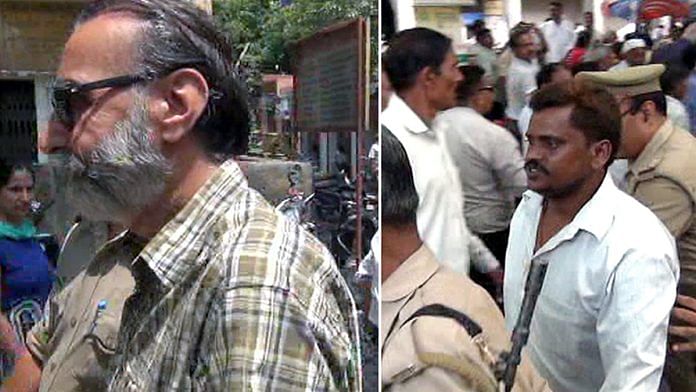New Delhi: Citing lack of evidence, a bench of the Allahabad High Court Monday acquitted Surinder Koli, prime accused in the 2005-06 Nithari killings, in 12 of the total 16 cases lodged against him, and his employer Moninder Pandher in two of the six cases lodged against him, while also setting aside the death sentences handed to them by a trial court.
Koli was handed the death penalty in 12 cases and acquitted in another three, while Pandher was handed the death penalty in two cases.
According to Manisha Bhandari, counsel for Pandher, of the total 19 cases lodged against the two in connection with the Nithari killings, the CBI filed closure reports in three citing lack of evidence.
Pandher now stands acquitted in all six cases lodged against him — which means he will walk free. Koli, however, will continue to be behind bars owing to a Supreme Court judgment that upheld the death penalty handed to him in the 2005 murder of a 14-year-old girl. In this particular case, Pandher was acquitted by the Allahabad High Court earlier.
Koli worked as the domestic help at Pandher’s residence in Nithari village in Noida’s Sector 31. In December 2006, the recovery of skeletal remains of eight children from the drain behind Panther’s residence led police to suspect the two of serial killings.
ThePrint looks back at the events that transpired since the Nithari killings first came to light 17 years ago and how the case later took many turns, from allegations of sexual assault, murder and cannibalism to allegations of dereliction of duty against police officers.
Also Read: Remember ‘Bois Locker Room’? Trial in 2020 case yet to start, forensic report on mobiles awaited
How Nithari killings came to light
Sometime in 2003, three years before the killings came to light, police in Noida reportedly began receiving an abnormally high number of complaints about women and children disappearing in and around the Nithari village. While complaints were filed with the police in many of the cases, investigators found nothing of consequence during the investigation.
At the time, Koli was working as a domestic worker at the residence of Pandher, a businessman.
In May 2006, after a woman disappeared from the area, her father told the police that she went to Pandher’s residence on the day of her disappearance. No FIR was lodged until June that year when the father landed up at the official residence of a senior police officer and demanded that a case be filed in connection with the disappearance of his daughter.
The police then traced her cell phone, which led them to Koli who was subsequently arrested but later released on bail. Not long after that, plastic bags stuffed with skeletal remains of children were found in a drain behind Pandher’s residence that December.
On 29 December 2006, both Koli and Pandher were arrested.
The probe was handed over to the CBI on 10 January 2007. A team of the CBI comprising forensic experts visited the area the next day and found more sets of skeletal remains.
On 1 March 2007, Koli while recording his confession in the presence of a Magistrate admitted in “great detail” how he “killed” the victims after “luring them inside the House no. D-5, Sector 31, Noida by strangling them, and he would then chop up and eat up their body parts after cooking them”.
In a chargesheet filed in 2007 in connection with one of the Nithari killings cases, the CBI had alleged that Koli suffered from ‘necrophiliac’ and ‘cannibalistic’ tendencies.
Following his confession, Koli was taken to Pandher’s residence and reportedly led investigators to more skeletal remains.
In the case of the missing woman whose father had told the police that she went to Pandher’s residence on the day of her disappearance, Koli was charged with rape and murder, besides being accused of “eating” her human remains, while the CBI gave Pandher a clean chit. In a second case, Pandher was let off and Koli accused of rape and murder.
A CBI court then ordered the agency in March 2007 to take a fresh look at Pandher’s role in these cases and he was subsequently charged with rape and murder in six cases.
Cut to 2009, Koli and Pandher were handed the death penalty by a special CBI court for the 2005 murder of the 14-year-old girl who went missing in February that year. The Allahabad High Court later acquitted Pandher but upheld Koli’s sentence in this case.
In 2017, both Pandher and Koli were sentenced to death by the special CBI court for the rape and murder of the missing woman whose father had led investigators to Koli and Pandher. This is one of the cases in which the High Court acquitted them Monday.
(Edited by Amrtansh Arora)
Also Read: From Raman Raghav to Cyanide Mallika, a look at India’s most notorious serial killers



